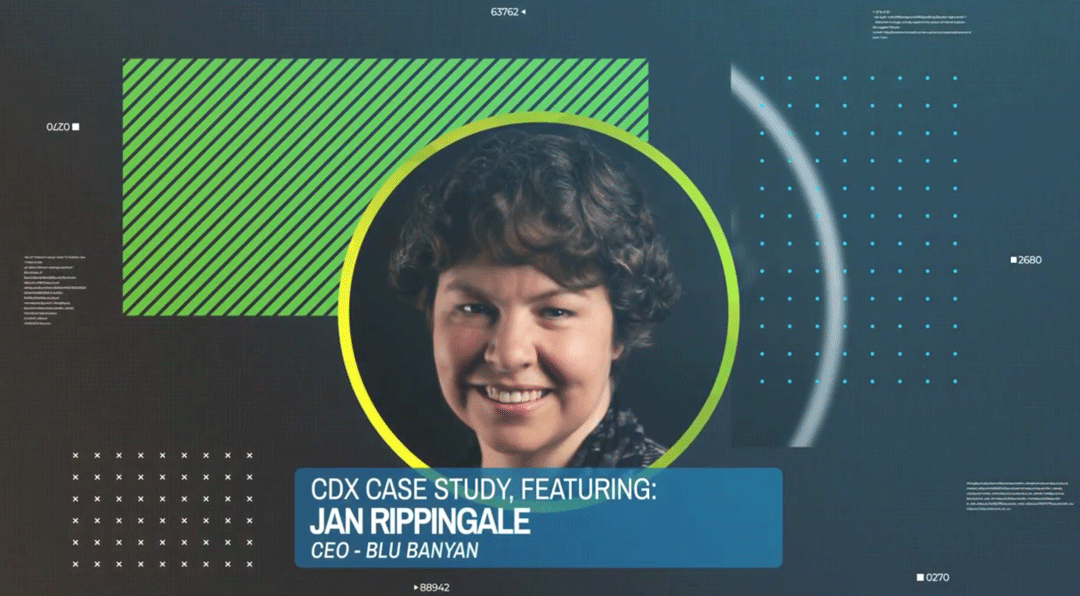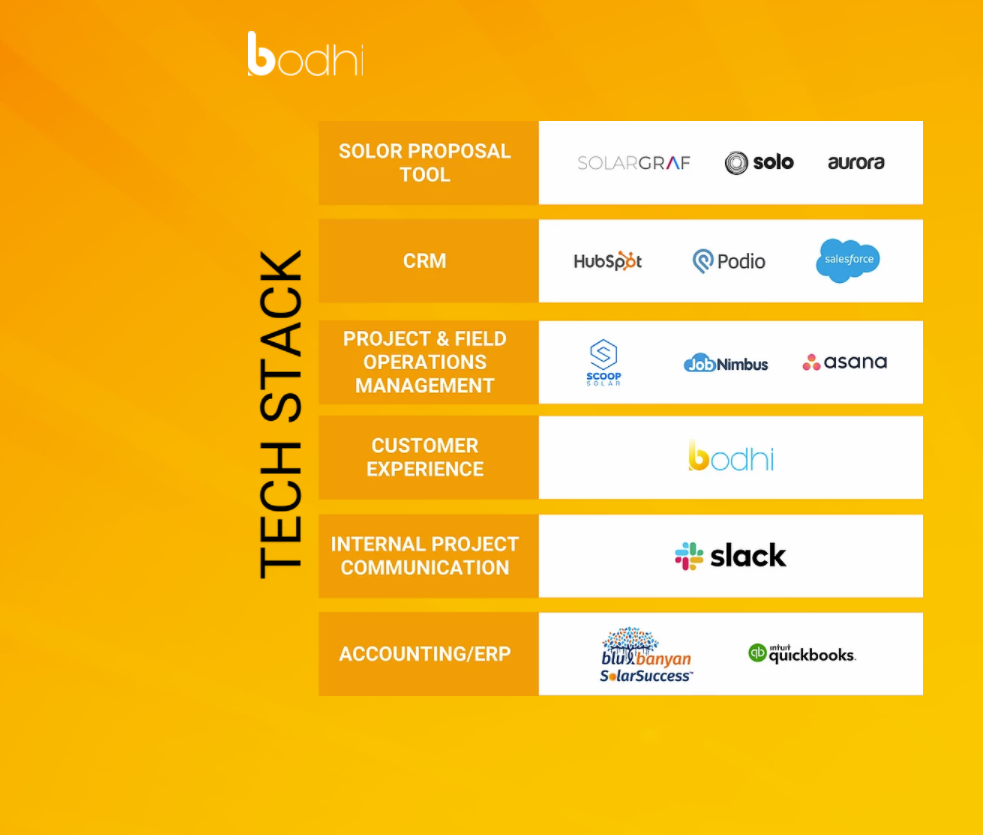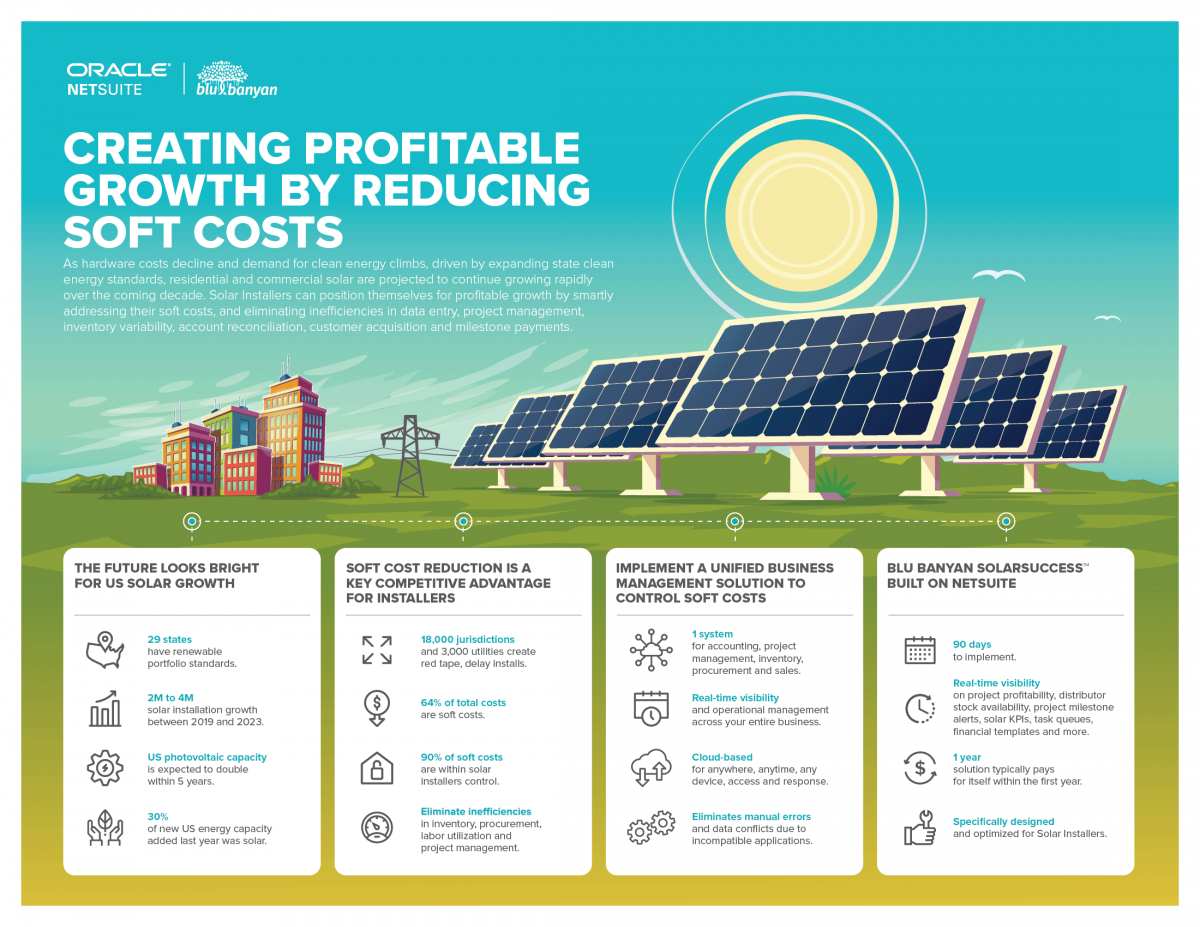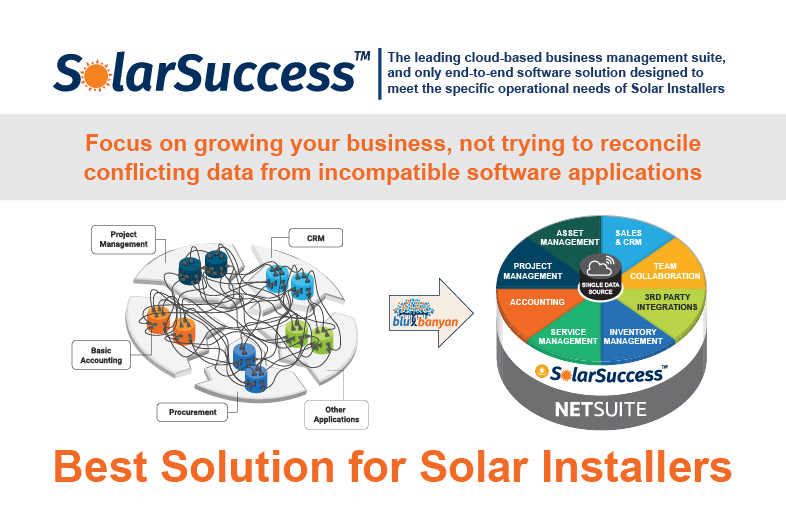By combining NetSuite cloud ERP with an industry-specific platform, SolarSuccess, Titan Solar Power has been able to efficiently manage its increasing share of the nation’s expanding solar market.
The residential solar installation business is booming.
In fact, on an annual basis, the solar energy sector grew by 43% in 2020, during which time more than 19 gigawatts direct current (GWdc) of solar power was installed. According to the Solar Energy Industries Assoc., by 2025, the U.S. solar market will increase by over 107 GWdc.
“Our strategic partnership with Blu Banyan helps us identify and prioritize specific features for development by Blu Banyan that will increase our productivity. Additional solar-specific integrations (e.g. manufacturers of solar equipment) will be added into SolarSuccess as Blu Banyan partners with Titan.”
Aaron Casillas, Technology and Infrastructure Director, Titan Solar Power
For Titan Solar Power, a rooftop solar contractor founded in Mesa, Ariz. in 2013, that meant rapid growth. The company installed 153.5 megawatts (MW) of capacity in 2020. That makes it the third-largest residential installer in the U.S. with about 1% market share of the total solar market. Titan consistently ranks on numerous industry “best of the best” lists. Its most recent accolade was Solar Power World’s #1 Top Solar Rooftop Contractor of 2019 and 2018.
Focused on project management and solar installation (versus solar sales), Titan posted annual growth in the quadruple digits between 2017 and 2020 and currently has 1,000 employees. In 2019, its management team realized that the company could no longer maintain its growth while running on siloed technology systems.
“We had a project management system, a file storage system, an accounting system and others,” said Aaron Casillas, Technology and Infrastructure Director of Titan Solar Power. “Sharing data across these systems was difficult, and in most cases our only way to ‘patch the holes’ was by adding labor.”
Titan works with a nationwide network of sales organizations, taking over installation once the deal is in place. It manages the design, negotiates with utility companies, secures the required permits and handles the loans, leases or other financing required to see the project through to completion.
“We provide a turnkey service once the sales reps hand off the contract to us,” Casillas explained. “We take it from there and make sure customers get successful solar installations on their homes.”
Facing Key Industry Challenges
Yet, despite this surge in demand, challenges remained. While the cost of solar-related hardware for both Titan and the solar installation industry as a whole has declined, reducing soft costs while still pursuing growth is a major challenge. These soft costs—which include expenses associated with customer acquisition, marketing, field labor, financing, inspection and permitting—typically comprise as much as 65% of the total cost of residential and commercial solar systems and can vary significantly in today’s fragmented energy marketplace. For example, solar installations can require cutting back or removing trees, roof repairs, or rewiring, and weather can significantly impact labor costs. Meanwhile, permitting and inspection practices are inconsistent across municipalities, which can lead to higher labor overhead as well.
The total direct and indirect cost of permitting for a residential system is on the order of $1/watt (or $6,000 – $7,000 per system) for residential solar PV systems. The SEIA estimates that a one week delay in system installation due to permitting inspection and interconnection processes increases the client cancelation rate by 10%.
“Solar installation has many moving parts, all generating soft costs, and there is no single application that solves them all,” said Casillas, “because you have to address inefficiencies across all functions of the entire company.”
Looking for a More Suitable Solution
Titan determined that its homegrown project management system couldn’t scale with its growth and the increasing complexity of the market. Its accounting and other disparate systems weren’t much help either, so Titan went in search of a cloud enterprise resource planning (ERP) solution.
“We couldn’t do nice, clean integrations across our systems, and we didn’t have much data for doing high-level analysis of our business,” said Casillas. “We wanted to get everything on one system.”
Titan also needed a system that could efficiently manage the more than 420 different data fields required for every solar project. Because it regularly pays out commissions to dozens of different sales organizations for those projects, it also needed a simple automated process for handling those transactions.
After considering its options, Titan found what it was looking for in award-winning SolarSuccess, a SuiteApp built on the NetSuite cloud ERP platform. Working with its implementation partner Blu Banyan, Titan went live on NetSuite – SolarSuccess in February 2020. As part of Titan’s implementation, Blu Banyan also installed bluChat, a native NetSuite communication and team collaboration tool.
Designed for the solar industry, SolarSuccess provides enhanced, solar-optimized sales pipeline management, customer relationship management (CRM), accounting, purchasing, installation project management (including per project costing and profitability), inventory management, customer invoicing, universal financier connectivity, team collaboration and business intelligence, all optimized for the solar-power industry.
“We looked at other solutions,” Casillas recalled, “but NetSuite worked out best for us because it handles accounting and operational logistics items in tandem with project management really well. SolarSuccess streamlined things even further and allowed us to add our own customizations on top of NetSuite.”
The Future is Bright
Titan’s new system also simplified its commission payout process and reduced the amount of labor needed to manage those transactions. Its commission payouts involve baseline rates and complex project-specific upsell item calculations and pricing. All of this is now captured by the first person in the workflow stream, whether its the sales partner, project manager or accounting.
“With NetSuite, we’ve significantly decreased the amount of labor involved in paying out our partners,” said Casillas, “and made that process very consistent across the board.”
bluChat was another important contributor to Titan’s enhanced productivity with its extensive real-time and asynchronous team collaboration capabilities. It included unlimited users, direct messages and channels, on-record chat access determined by role, the ability to generate, assign and schedule a task directly from a record, file sharing for all NetSuite supported formats, and rich usage analytics. Titan also uses Blu Banyan’s bluDocs application for file storage—a key capability in an industry that requires extensive sharing of high-resolution photos, plans and other documents. bluDocs integrates directly with Amazon for file storage.
“bluChat has been a key driver in elevating Titan’s overall performance and productivity. Thanks to its integration, our employees are able to communicate in real time interdepartmentally and nationally on the relevant NetSuite records. The ability to effectively engage with each other, and our partners, allows for faster issue resolution behind the scenes, which leads to better customer experience.”
Aaron Casillas, Technology and Infrastructure Director, Titan Solar Power
Reflecting on the company’s NetSuite – SolarSuccess implementation and the value that Blu Banyan provided, Casillas said the latter’s extensive pool of IT experts was vital during the transition process.
“We had different knowledge pools to pull from and consult with on issues like data disparities, process changes and required adjustments,” he said. “Blu Banyan’s breadth of expertise was a critical resource for us.”
With NetSuite and SolarSuccess, completed project actions trigger immediate notification of downstream departments, which means hand- off delays and fumbles are effectively eliminated, reducing the amount of time it takes to complete project installations. For example, as soon as Solar System Design is marked as “completed,” the project shows up as “ready for permitting.” Titan has also added an “install portal” that homeowners can use to track the progress on their installations, giving Titan greater visibility over its customer interactions and operational data.
The company has grown significantly since the implementation and is on track to expand even further in the coming years. As that happens, it will have a robust cloud ERP and industry- optimized platform in its corner.
“We’re always looking to expand our footprint and grow in new markets,” said Casillas, whose team has numerous new integrations planned, including one with SolarEdge, a partner that makes inverters needed for measuring electrical production. “We’re adding in new functionality every week and have a long list of new features we’re working on and hoping to release soon.”
This article was published by NetSuite: (pdf download)
Sky’s the Limit for Titan Solar Power with NetSuite – SolarSuccess
Check out the the interactive infographic about this case study to get the full understanding of Titan’s Success Story.















